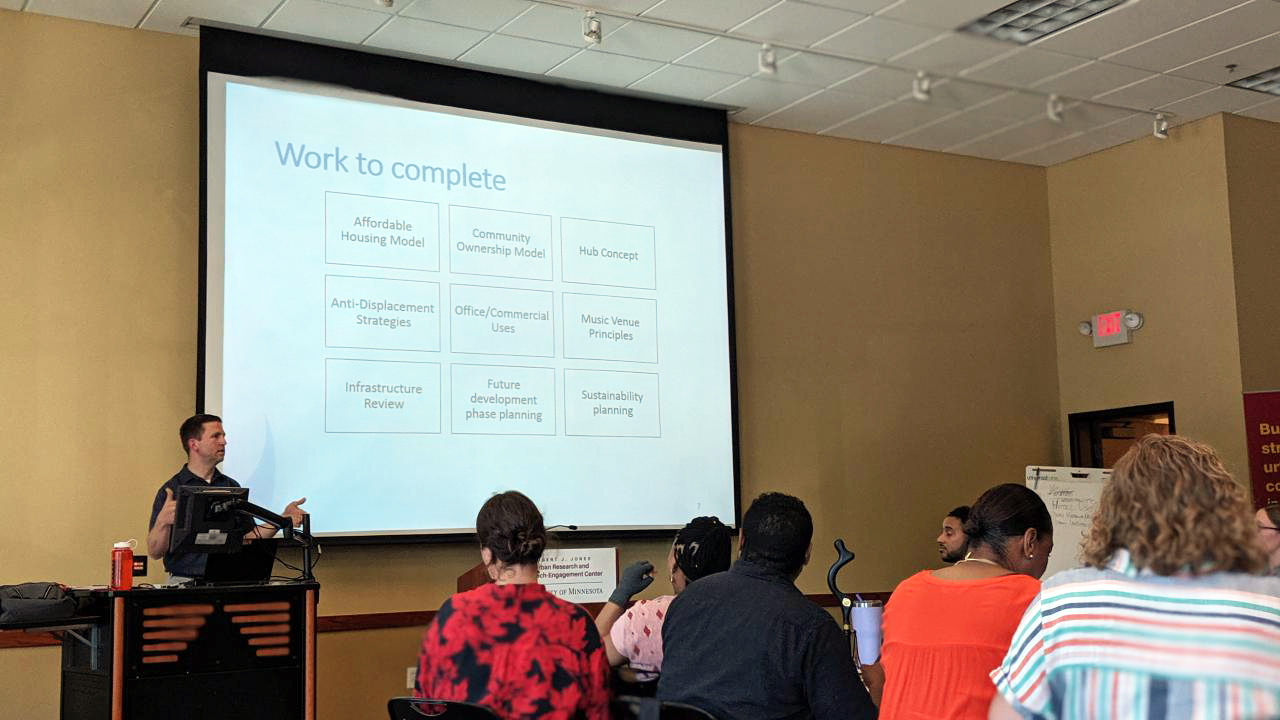FMR voices concerns around Upper Harbor Terminal process
At a recent Upper Harbor Terminal Collaborative Planning Committee meeting, city staff outlined several key elements of the redevelopment plan that need to be resolved in the next few months, including anti-displacement strategies, sustainability planning, affordable housing and community ownership.
This spring, the Minneapolis City Council approved a rough plan for the Upper Harbor Terminal and promised opportunities for substantial community engagement before plans are finalized.
As we've participated in the last few months of community engagement around the Upper Harbor Terminal (UHT) redevelopment project in North Minneapolis, FMR has become increasingly concerned about how rushed and incomplete this process appears to be. We don't believe that recent engagement activities, which have included a planning committee meetings and a community learning table, fulfill the city's own commitments to a democratic and inclusive plan. (Read more about our experience at one recent community meeting.)
FMR has sent letters to Mayor Jacob Frey and the Minneapolis City Council outlining our concerns and suggesting some ways in which the city could follow through on its commitments to the community. With the city's rushed timeline we can't afford to lose a single day to an inadequate process.
Concerns about the community engagement process
Our concerns about recent engagement events include:
-
The events marketed as the primary opportunities for public voice in the project are 4-8 hour long workshops. This excludes community members who can’t devote such a large block of time and actually discourages participation from a diverse and representative sample of community members. Childcare, transportation, interpretation, stipends/compensation and other elements that can reduce barriers to participation have not been provided to date.
-
The city's Collaborative Planning Committee (CPC) was appointed as a key resident voice on this project. Yet at its first four meetings, many members have expressed ongoing confusion about the fundamentals of their work: what decisions the CPC is making; the timeline for making those decisions; what the coordinated plan must include; and the project’s goals, values and priorities. The city has not provided adequate information or structure to resolve these questions.
-
Many key elected officials have been absent from all or most of the recent UHT community and CPC meetings. They're not hearing the community concerns raised at these meetings and community members haven't been able to engage in direct dialogue with their leaders.
- We're not aware of culturally-specific outreach to North Minneapolis' immigrant communities nor to the Dakota community with 1,500 years of history on this site.
Our recommendations
Our largest recommendation for how the city can improve its community engagement process is to slow down.
We're only months away from the city's deadline to approve a coordinated development plan, sell the property to United Properties, and seek state bond funds for First Avenue's concert stadium. That is not enough time for a truly inclusive community participation process, especially when the process to date has been poorly planned, confusing and filled with barriers to participation.
You can read the full text of our letters to Mayor Frey and the Minneapolis City Council here.
For more about Upper Harbor Terminal, follow our UHT Twitter account, check out our blog, or contact Colleen O'Connor Toberman, River Corridor Program Director, at ctoberman@fmr.org or 651-222-2193 x29.
Minneapolis residents, take action now. Urge the mayor and city council to prioritize the Northside community during the redevelopment process.
You can also become a River Guardian to hear from us when opportunities for action arise.
